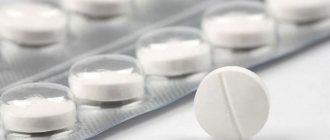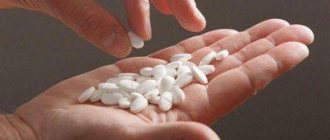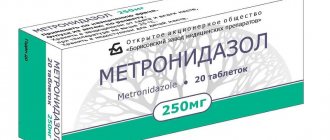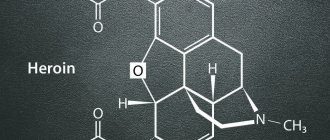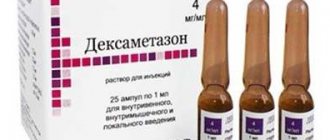Jars of Aspirin
The patented trade name of acetylsalicylic acid is Aspirin. The pharmacological effect, mechanism of action and safety profile of the drug have been studied for a long time, but an overdose of Aspirin is a life-threatening condition. It is important to follow the dose. The substance belongs to the group of non-steroidal anti-inflammatory drugs.
How does aspirin affect the human body?
Once in the human body, aspirin has several biological effects:
- reduces the severity of inflammatory processes of any localization;
- reduces the intensity of pain and tissue swelling;
- reduces the ability of platelets to stick together, thereby preventing the formation of blood clots in the blood vessels and cavities of the heart;
- has an antipyretic effect.
The main indication for the use of acetylsalicylic acid is fever over 38.5ºC in adults. In low dosages, aspirin is used to prevent thrombosis in people with heart and vascular diseases.
Why can you be poisoned by aspirin?
The main reason for the development of side effects of the drug is non-compliance with contraindications for its use and taking large doses of the drug. In addition, chronic toxicity develops as a result of long-term use of aspirin in the absence of medical supervision. Drug poisoning occurs in the following cases:
- Self-medication with medication without prior consultation with your doctor. In these cases, a person often does not study the instructions for use of acetylsalicylic acid and does not comply with the contraindications indicated there.
- Admission in childhood against the background of elevated body temperature.
- Using a large dosage of the drug to speed up recovery.
- The presence of kidney or liver diseases that have not previously been identified in the patient.
The duration of use of the drug, as well as the dosage, determine what type of intoxication will develop. Acute and chronic overdose differ in clinical signs and prognosis for a person.
Properties and effect of the drug
The drug belongs to the group of non-steroidal anti-inflammatory drugs. Used only according to prescription. Self-administration often ends in overdose, leading to complications. The dosage is carefully calculated based on test results.
The medicine is recommended to be taken due to the following actions:
- Effectively fights high body temperature;
- Relieves painful spasms in muscles and head;
- Eliminates inflammatory processes;
- Thins the blood, preventing blood clots;
- Required for atherosclerosis, cardiac and vascular diseases;
- Restores blood structure;
- For acute respiratory viral infections and acute respiratory infections, it eliminates the effects of pathogenic viruses;
- Works as a pain reliever;
- Can be used to relieve alcohol intoxication.
The active ingredient of the drug is acetylsalicylic acid, which is included in other drugs with a similar effect: Cardiomagnyl, Acecardol, Trombopol and others. The substance is quickly absorbed into the blood, beginning its therapeutic effect. Almost completely excreted by the kidneys.
Aspirin has a number of contraindications when use is dangerous to health:
- Gastric ulcer and high concentration of acid in the gastric microflora;
- Low blood clotting;
- Individual intolerance to the active substance or other components;
- Serious lung disease - bronchial asthma;
- During pregnancy and during breastfeeding;
- Pathologies of kidney tissue;
- Joint diseases - gout.
It is not recommended to take pills if such symptoms are present. Complications of current chronic pathologies can be provoked. You need to take the medicine with food - you cannot take it on an empty stomach.
Children under 12 years of age are prohibited from taking it, only in exceptional cases under close medical supervision.
Clinical picture of chronic poisoning
In case of chronic overdose of aspirin, the consequences are associated with damage to internal organs and the nervous system. It is difficult to identify them in a patient, since they are similar to common diseases of the gastrointestinal tract and other systems. The main symptoms are as follows:
- headache that does not have a clear localization;
- nausea, vomiting, heartburn and chest discomfort;
- increased sweating, which also occurs at rest;
- transient hearing loss, which can become permanent as poisoning progresses;
- pain in the epigastric region;
- dyspepsia: flatulence, stool disorders, etc.;
- anemia as a result of a decrease in the number of red blood cells in the blood, thrombocytopenia;
- fainting.
READ Afobazole overdose
With prolonged uncontrolled use of aspirin, patients develop bronchial asthma, associated with disturbances in the regulation of the lumen of the bronchi and the secretion of mucus in them. In the presence of chronic heart failure, the drug may cause it to worsen.
What caused your interest in information?
Antidote
Despite the constant consumption of aspirin by the population, an antidote for a simple but dangerous drug has not been developed.
- A child’s body or the body of a very elderly person cannot cope on its own with even minor intoxication. In this case, an ambulance must be called.
- For pregnant women, aspirin is indicated with great caution, as it may adversely affect the development of the fetus. And if symptoms of poisoning are noticed in a pregnant woman, then medical attention is needed immediately.
- You cannot do without the intervention of doctors even with prolonged vomiting. If the vomiting does not stop, then you will not be able to stop the development of poisoning on your own.
- When intoxication has already affected the entire body and this can be noticed by problems with speech and hallucinations in the patient.
- If the patient does not react to anyone or anything. Located within itself. He is in a depressed state. Case for professional help only.
- A sharp jump in body temperature. The temperature may rise further. You can't hesitate.
- Too obvious disturbances of heart rhythms. A sharp drop in pressure.
Signs of acute aspirin intoxication
When a single dose of a drug is taken once, the patient experiences clinical manifestations of acute poisoning. In this case, the severity of symptoms depends on the dosage of aspirin and the presence of concomitant pathologies.
Mild degree of poisoning
Symptoms of mild drug intoxication are similar to those of chronic intoxication. An important difference is the absence of fainting, which allows for differential diagnosis. When conducting a biochemical blood test, the drug is detected in an amount of less than 150 mg/l.
Average degree of poisoning
When the concentration of aspirin in the blood is from 300 to 500 mg/l, pulmonary dysfunction is primarily observed. There is increased breathing, coughing with mucus, and shortness of breath. A slight increase in body temperature to 38-38.5ºС is typical. If you have diseases of the internal organs (kidneys, liver, etc.), signs of their failure may appear. Severe poisoning
READ Nicotine overdose
The main sign of severe intoxication is respiratory failure, progressing to pulmonary edema. The patient experiences tachypnea (increased breathing), tachycardia (high pulse), increased cough and shortness of breath. With pulmonary edema, foam appears at the mouth, which is an unfavorable prognostic sign. As a result of developing hypoxia, cyanosis of the skin occurs and the functions of internal organs are disrupted:
- The kidneys are affected with the development of acute renal failure, characterized by a decrease in diuresis and accumulation of metabolic products (urea, etc.) in the blood.
- The electrolyte balance changes - the amount of sodium increases and the concentration of potassium in the blood decreases.
- As a result of the accumulation of metabolic products in the bloodstream, encephalopathy develops. The patient has qualitative and quantitative disturbances of consciousness, as well as focal neurological symptoms.
- Cardiac ischemia is characterized by chest pain, anxiety and fear of death.
Acute renal failure, ischemic myocardial damage, or encephalopathy can cause the patient's death.
Lethal dose of aspirin
Doctors know well how many acetylsalicylic acid tablets can kill a person. It is important to understand that this depends on the patient’s age, body weight and the presence of concomitant diseases. It is believed that the lethal dose of the drug is 500 mg per 1 kg of body weight. Accordingly, if a person weighs 60 kg, then death is possible when taking 60 tablets of the medicine at the same time.
When is medical attention required?
Medical assistance is necessary in a number of cases:
- a pregnant woman, a child, an elderly person was injured;
- after first aid, the victim’s condition remains unchanged or worsens;
- uncontrollable vomiting;
- traces of blood in vomit, feces;
- bleeding (regardless of location);
- neurological symptoms (hallucinations, disorientation, depression of consciousness, uncontrolled psychomotor agitation, slurred speech);
- the victim is not available for contact, is in a state of depressed consciousness;
- uncontrolled increase in body temperature;
- bradycardia less than 45-50 beats/min, severe tachycardia or arrhythmia.
If necessary, the victim is hospitalized in a specialized department of the hospital, where he is provided with qualified medical care:
- alkalinization of blood with hypertonic sodium bicarbonate solution;
- forced diuresis with Furosemide (to enhance the excretion of drug metabolites by the kidneys);
- if bleeding develops - replenishment of the deficit in circulating blood volume (Reopoliglyukin, Hemodez), oxygen and hemostatic therapy (Etamzilat, Ditsinon), if necessary - surgical intervention;
- hepatoprotectors (Essentiale, Heptral, Karsil);
- extracorporeal detoxification methods;
- oxygen therapy, mechanical ventilation;
- with the development of convulsive syndrome - benzodiazepines.
What to do in case of overdose
Proper first aid for aspirin poisoning can prevent the development of serious consequences for human health. If intoxication is detected, you should always call an ambulance, since independent attempts at therapy are most often not effective.
As first aid, a person undergoes gastric lavage to remove any remaining drug that has not yet passed into the intestines. For this purpose, the victim is given 1-2 liters of warm water to drink, after which they reflexively induce vomiting.
The procedure should be repeated until clear vomit appears. To cleanse the intestines, you can take enterosorbents (Enterosgel, Activated carbon, etc.). Additional procedures are carried out in the medical institution:
- Massive infusion therapy with crystalloid solutions (Disol, Isotonic sodium chloride solution) with forced diuresis. Furosemide and similar agents are used to enhance diuresis.
- Normalization of electrolyte balance in the blood after biochemical determination of ion concentration.
- Symptomatic treatment aimed at stabilizing the functioning of internal organs: kidneys, heart, etc.
- Severe intoxication is an indication for hemodialysis.
READ Trigan-D overdose
There is no specific antidote for aspirin poisoning. However, if you quickly seek medical help, the prognosis for a person is favorable. After the drug is removed from the blood, the victim’s condition returns to normal and organ functions are restored.
Treatment
In the hospital, the patient is in the toxicology department. Here the necessary tests are taken and a course of therapy is prescribed:
- A repeated gastric lavage procedure is performed with a special medical probe.
- A rehydration solution is administered orally to compensate for the deficiency of microelements.
- A course of diuretics is taken to stimulate kidney function.
- When muscle cramps occur, anticonvulsants are taken.
- Blood transfusion is required if the toxin concentration is high.
- A number of drugs are prescribed to maintain and restore liver cells.
- In severe cases, oxygen inhalations are prescribed.
After therapy there is a recovery period. You need to adhere to a special diet, a vitamin complex and walks in the fresh air.
The mild stage of poisoning is treated on an outpatient basis. The patient is taken to the hospital to undergo the necessary tests and undergo mandatory manipulations. A course of medications is prescribed to restore the victim.
In some situations, urgent hospitalization is required:
- Sharp deterioration of condition;
- Feces and vomit mixed with blood;
- Internal bleeding;
- Critical indicators of heart rate and blood pressure;
- Body temperature rises rapidly;
- Children need qualified medical care;
- Pregnant women and elderly people need help.
What are the consequences of poisoning?
Intoxication of mild to moderate severity with timely treatment goes away without a trace for a person. In case of severe poisoning, adverse outcomes are possible:
- kidney damage with the development of glomerulonephritis and chronic renal failure;
- pulmonary edema;
- toxic encephalopathy with the formation of neurological deficit.
If the victim does not seek medical help, he may die as a result of brain swelling, internal bleeding or kidney failure. Death in severe overdose occurs within hours or days.
How to avoid overdose
Doctors highlight simple recommendations that can prevent acute and chronic aspirin intoxication:
- The medicine should always be kept out of the reach of children. Otherwise, the child may mistake the tablets for candy and eat them, despite the specific taste.
- When taking acetylsalicylic acid for a long time to prevent vascular thrombosis, you should adhere to the dosage and treatment regimens prescribed by your doctor. Self-prescription of medication is unacceptable.
- If a person uses several medications at the same time, then you should consult a specialist about their drug compatibility.
- For colds in children, taking aspirin to reduce fever is contraindicated. Preference should be given to other antipyretics.
- Aspirin should only be purchased from pharmacies licensed to sell medications.
- Medicines that have expired or are in damaged packaging are prohibited from use.
- When using aspirin, you should avoid drinking alcohol, as they increase the risk of developing side effects of the drug.
If you feel unwell or have any signs of drug intoxication, you should immediately consult your doctor. The specialist will conduct the necessary examinations, identify the cause of unpleasant symptoms and, if necessary, adjust the treatment regimen. Stop taking the drug, as signs of intoxication can progress quickly.


